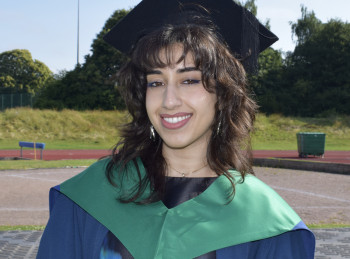Miss Kaainat Khan
MSc, BSc (Hons)PhD Candidate
School of Engineering and Material Sciences
SynAct Pharma
SynAct Pharma
Research
Organ-on-a-Chip, Synovium Joint, Cardiovascular Disease, Immunology, Infectious Disease, Bone Oncology, Molecular Medicine, Biochemistry
PhD Title
Development of a dual synovial joint and heart on-a-chip model for investigating heart disease in Rheumatoid arthritis and testing new therapeuticsInterests
Kaainat Khan is an emerging scientist at the forefront of organ-on-a-chip innovation, specialising in the development of advanced micro-physiological systems that have the potential to revolutionise drug discovery, clinical research, and personalised medicine. As part of Queen Mary University of London’s prestigious COaCT programme, she is pioneering a dual synovial joint, heart on-a-chip model, designed to investigate the molecular and biomechanical interplay between rheumatoid arthritis (RA) and cardiovascular disease. This cutting-edge system will mimic human physiology with a great degree of accuracy, to evaluate disease mechanisms and therapeutic responses in ways that conventional cell culture and animal models cannot. Her work holds far-reaching implications: accelerating drug development, reducing clinical trial timelines, eliminating reliance on animal testing, and lowering the environmental footprint of biomedical R&D.Kaainat’s expertise is rooted in a strong foundation in biochemistry and enriched by diverse clinical and medical experiences across the UK and internationally. This exposure has enlightened her translational perspective, enabling her to bridge laboratory innovation with real-world clinical needs. Her academic journey has spanned oncology, immunology, inflammation science, and molecular therapeutics, giving her a uniquely multidisciplinary knowledge.
During her MSc at Imperial College London, Kaainat developed efficient and productive quantitative imaging platforms to test PROTACs targeting pro-inflammatory cytokines. This work demonstrated the therapeutic promise of targeted protein degradation for conditions such as rheumatoid arthritis, strengthening her technical capabilities in advanced imaging, molecular targeting, and high-content analysis. It also deepened her motivation to contribute to immunology research with measurable clinical relevance.
In parallel with her immunology work, Kaainat remains deeply dedicated to oncology, particularly bone sarcoma research. Her engagement with survivors of osteosarcoma, Ewing sarcoma, chondrosarcoma, chordoma, and adamantinoma has given her an intimate understanding of the long-term toll of cytotoxic treatments. As first author of a significant publication in the Journal of Bone Oncology on late and long-term effects in bone sarcoma survivors, she highlighted critical gaps in post-treatment care and advocated for improved long-term care strategies.
Kaainat brings together scientific accuracy, clinical insight, and a strong sense of purpose. As a PhD researcher under the supervision of Dr Lucy Norling, Dr Jianmin Chen, and Prof Thomas Iskratsch, her objective is to develop next-generation in vitro systems that will support the discovery of precision therapeutics and improve long-term patient outcomes.
Publications
2025
 Post-treatment late and long-term effects in bone sarcoma: A scoping review
Post-treatment late and long-term effects in bone sarcoma: A scoping reviewKhan K, Kane K, Davison Z, Green D
Journal of Bone Oncology, Elsevier vol. 52
21-03-2025







